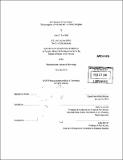Architecture's grand tourism : the emergence of Prishtina within a global discipline
Author(s)
Rushfeldt, Laura E
DownloadFull printable version (54.81Mb)
Alternative title
Emergence of Prishtina within a global discipline
Other Contributors
Massachusetts Institute of Technology. Dept. of Architecture.
Advisor
Mark Jarzombek.
Terms of use
Metadata
Show full item recordAbstract
This Thesis proposes a 2015 World's Fair in Prishtina, Kosovo, to redefine the relationship between tourists and local places. Globalization has created an explosion of world tourism; however, it has homogenized the global landscape and therefore the tourist experience. To counteract this erosion of the identity and sense-of-place, leadership in new nation-states believe that they must consciously exert a new individual identity. This scenario is flawed as well; groups in power seek to instrumentalize a false uniform and idealist identity to serve their own interests. If the global condition is overrun by the tourist, and the local condition is hijacked by the idealist, where does this leave the global-local debate in the discourse of architecture? Creating an ambiguous, complex, cultural condition that confronts and reinvents the most polarizing tendencies of the tourist and the idealist will meet the needs of the largest number of parties that have a stake in the architecture. As the world's newest nation, Kosovo has declared Independence and is partially recognized by the global community. From a decade under international jurisdiction, Kosovo has a complex relationship to the global. In recognizing that this global connection is economically essential to Kosovo, the new country needs to use this international presence to satisfy its own pressing need to establish the legitimacy of its new government. In this proposal, the international presence currently operating in Kosovo provides a network of structures for an International Fair which introduces Kosovo to the world. (cont.) This global tourist program is inherently subverted; the investment in urban infrastructure ensures that the architecture is seamlessly repurposed into Kosovo's new National Capital complex. This coupling of unlikely programs not only provides both financial capital and impetus to create the architecture, thereby addressing critical needs of Kosovo, but meshes together the touristic and nationalistic forms of national identity. The uneasy alliance between the two programs necessitates a redefinition of both.
Description
Thesis (M. Arch.)--Massachusetts Institute of Technology, Dept. of Architecture, 2010. Cataloged from PDF version of thesis. Includes bibliographical references (p. 165-[170]).
Date issued
2010Department
Massachusetts Institute of Technology. Department of ArchitecturePublisher
Massachusetts Institute of Technology
Keywords
Architecture.